If this question is on your mind for some time, you’ve come to the right place.
Facts show that Data Analytics has always been a part of our workforce, consistently analyzing data and facts for companies. In smaller organizations, the job titles of data analysts and business analysts are often used interchangeably. This is mainly because both these analysts handle data (from a broader perspective). These roles are treated differently in large (or more mature) organizations. At times, the line of difference between data analyst and business analyst may be blurred, but, in the end, the job environment and what each does with the data differs.
Thanks to big data, data scientists across the globe came into the limelight. Their involvement with data within a company goes long and deep, making these scientists a core resource for any company.
Why do companies value data (and data analysts)?
The fact that companies are thriving on data is directly proportional to the high demand for data analyst role in company. Here, let’s talk about companies of enterprise stature.
These companies handle huge sets of data, both structured and unstructured. They need proper structuring and engineering brains to make sense of this huge data set. A data analyst analyses these data and creates measurable insights that are significant for any business to grow and thrive in such a competitive world.
Hence, it makes sense that companies value data and people who work with the same. These are the people who handle sensitive data and maintain privacy while deriving meaningful business insights from humongous data sets.
This analogy brings us to our next pertinent question: Should you opt for business analyst or data analyst profile?
As I mentioned in the beginning, the difference between data analyst and business analyst lie in the area of work. In both the profiles, you will be dealing with data and trying to make sense of it; but your target and purpose will change with each profile.
To understand the similarities and difference between data analyst and business analyst, you need to understand what each profile is about clearly. When you want to pick a particular profile as your business analyst or data analyst role in company, you must understand where it will place you in the long run and if you are ready for it.
Let’s dig in!
An Overview: Business Analyst vs Data Analyst
A business analyst will always oversee the business implications of data on a larger scale. They predict long-term actions based on their research, for example, developing a new product line or prioritizing a business activity over others. This role requires a perfect amalgamation of applications, skill sets, and tools that will enable a business to measure business achievements and work on improving the effectiveness of any core business function, like marketing, sales, or IT.
On the other hand, a data analyst is responsible for determining patterns or trends by analyzing huge data sets. A data analyst predicts trends, concludes several hypotheses and enables a business to make data-driven decisions. When I say ‘hypotheses,’ it does not mean any random theory.
When a business appoints a data analyst, that analyst creates several hypotheses, like predicting certain business-driven conclusions, considering all the available resources and tentative business goals. After that, they analyze data, determine conclusions, and pit them against these hypotheses to see if they can be practically implemented. If yes, they pull out data-driven roadmaps to achieve them.
In layman’s terms, a data analyst can answer simple questions like the geographical impact of my mobile company or which customers will purchase in the next 30 days. This job role requires sufficient knowledge of a diverse set of approaches using statistical and machine techniques. The data analyst role in the company also has some overlap with the roles of a data scientist, data modeling engineer, and data mining specialist.
Summing it up, the role of business analyst and data analyst can be broken down into three sections: goals, data, and approach.
Goals:
- Business analyst: To identify trends in an organization to conclude one version of the truth that can be optimized and used to improve business performance.
- Data analyst: To recognize patterns in data and make accurate predictions considering all events of past, present, and probable future.
Data:
- Business analyst: Work with predefined data sources based on project goals.
- Data analyst: Ad hoc work with data sources; data sources are added with time as correlations are discovered.
Approach:
- Business analyst: Defines goals and requisites for programs or projects.
- Data analyst: Takes a predictive and prescriptive approach.
This gives us a broader perspective on how business and data analysts approach or function within an organization. Now, let’s see what it requires to make a career as a business analyst and data analyst.
Choosing Career Prospect: Business Analyst vs Data Analyst
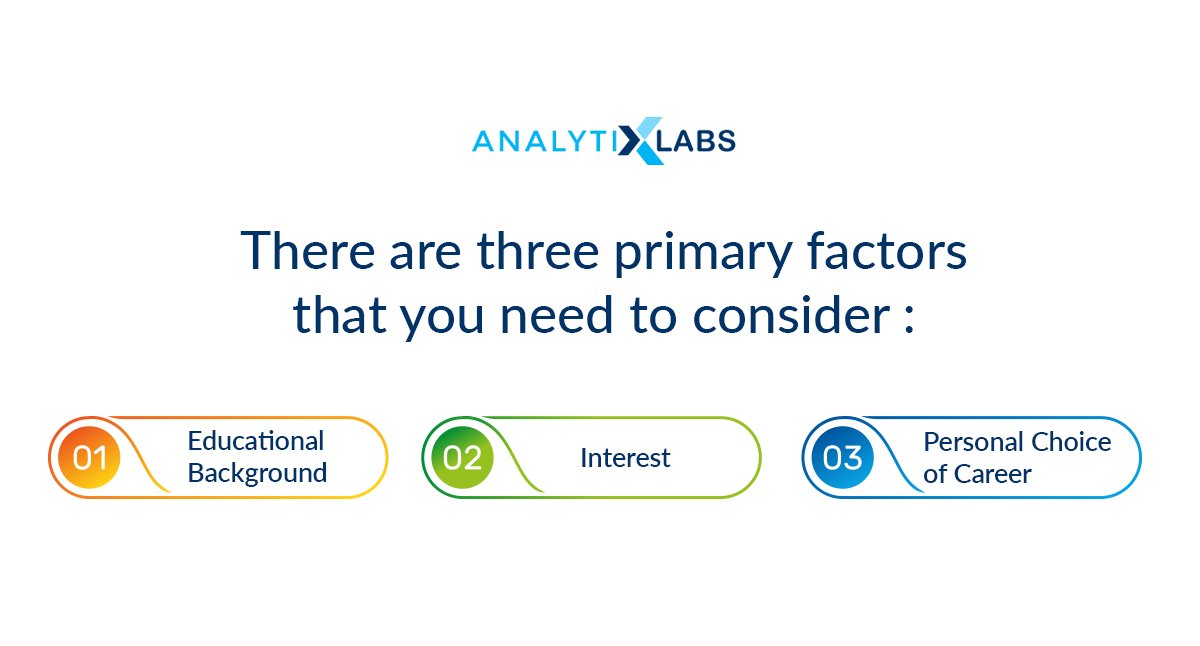
Educational background
Blake Angove, LaSalle Network (director of technology services), believes that business analyst and data analyst tend to come with different backgrounds both academically and professionally.
A business analyst usually will have completed an undergraduate degree in a major that is business-focused. This kind of qualification is considered ideal because a business analyst uses business requirements and works with the technical team to create a business feature or package.
A data analyst, on the other hand, works with large data sets to predict business outcomes. Hence, these professionals usually come with STEM majors with extensive mathematics, science, programming, databases, and predictive analytics.
Interests
This (and the next point) is very important to consider when trying to etch out a career path for yourself. Whatever role you pick should align with your interests. For instance, imagine a professional having interest in creating graphics for marketing but working with data! This is a classic example of resource waste. Don’t do that. If you find numbers and statistics interesting, you are more inclined to be a great data analyst. If your inclination is towards solving core business problems using data, then business analyst is the best role you can opt for.
A business analyst enjoys the corporate world and tends to solve business challenges on a larger scale. They are involved in researching, organizing, and looking into the implementation of a new workflow. Add to this, these professionals have amazing written and oral skills and are fantastic communicators. This is simply because business analysts are responsible for explaining their concepts to technical teams and stakeholders before a workflow is implemented practically.
On the contrary, a data analyst is driven by numbers. They excel in mathematics and statistics. These professionals look over data and extract meaningful insights from disparate sources and complex data points.
Personal choice of career
Your CHOICE is the most crucial factor in determining which role you will take. You might be great at communications, but your heart lies in the visual extraction of data. Try understanding where you actually want to be. Not just that, where do you see yourself in the next 5 years’ time after starting with either of the roles.
Your choice also depends on:
– Salary insights
– Your subject matters
Both these job roles may have different salaries or sometimes be the same as well. However, their potential career path will always differ. Take a look at how the career path for each of these roles looks:
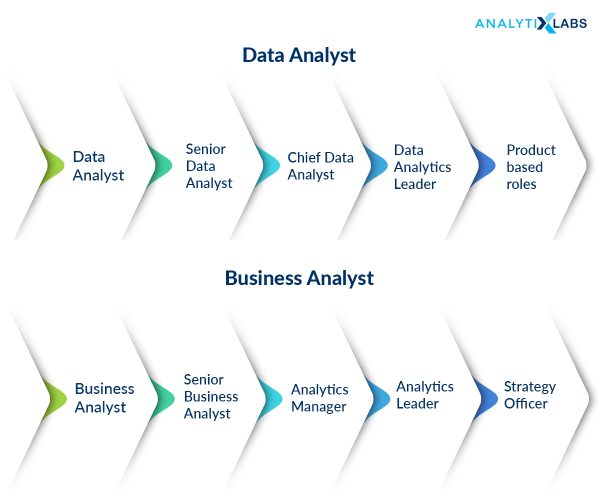
Just know, you can pick any of the two roles, but it is always advisable to pick the one for which you can acquire the requisite skills.
You can look at the course materials on AnalytixLabs for each of these subject matters to get a better insight.
Data Analyst vs Business Analyst Salary in India
It’d be a lie to say salary isn’t important. It is very much important, but of course never at the cost of exploiting your talents.
Business analyst and data analyst can make amazing fortunes if they have the requisite skills and a determination to make it big.
Recent trends show that companies are more and more realizing the benefit of having an in-house business analyst. With a predicted growth rate of 19 percent in the next ten years, the role of a business analyst is expanding in terms of salary.
For instance, Glassdoor estimates the average salary for a business analyst to be about $75,637. Business Analyst Salary in India starts from about 3.5 lakhs and goes up to 15 lakhs per annum, with an average base of 7 lakhs per annum.
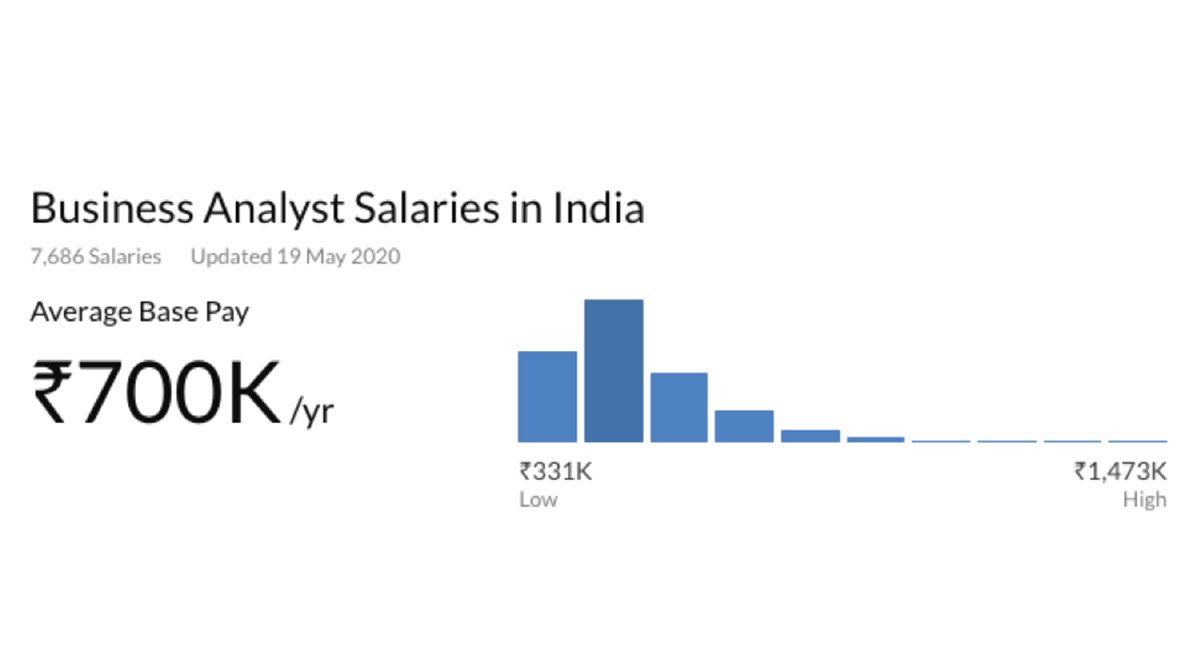
Similarly, Glassdoor estimates the salary of a data analyst in NYC to be about $66,859. In India, Data Analyst Salary starts from about 3 lakhs and goes up to 10 lakhs per annum, with an average base of 5 lakhs per annum.
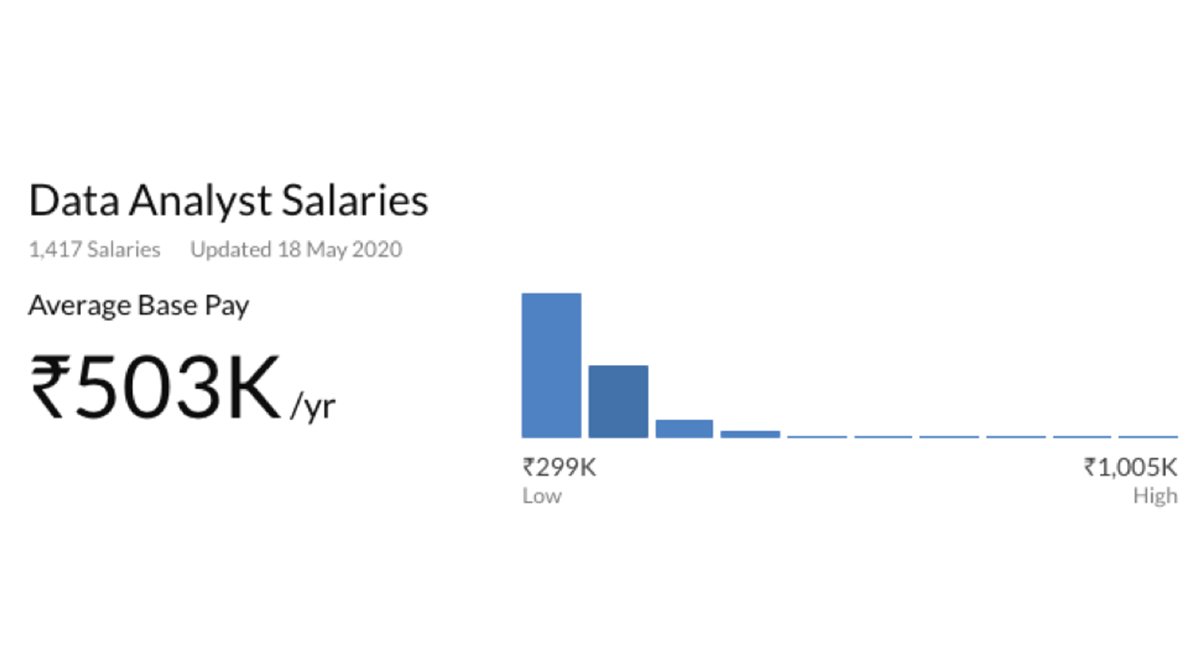
Important Tip: Initial salaries may be more appealing for the Business Analyst role. However, Data Analysts offers a promising gateway to more lucrative roles like Data Scientist, which is a more rewarding career choice than mid to long term.
You may also like to read out our latest post on Data Analyst Salary in India
This leads us to the next section:
What are the skills required: Business Analyst vs Data Analyst
According to PWC, you can see below the data skill sets you’ll require for data-related job roles.
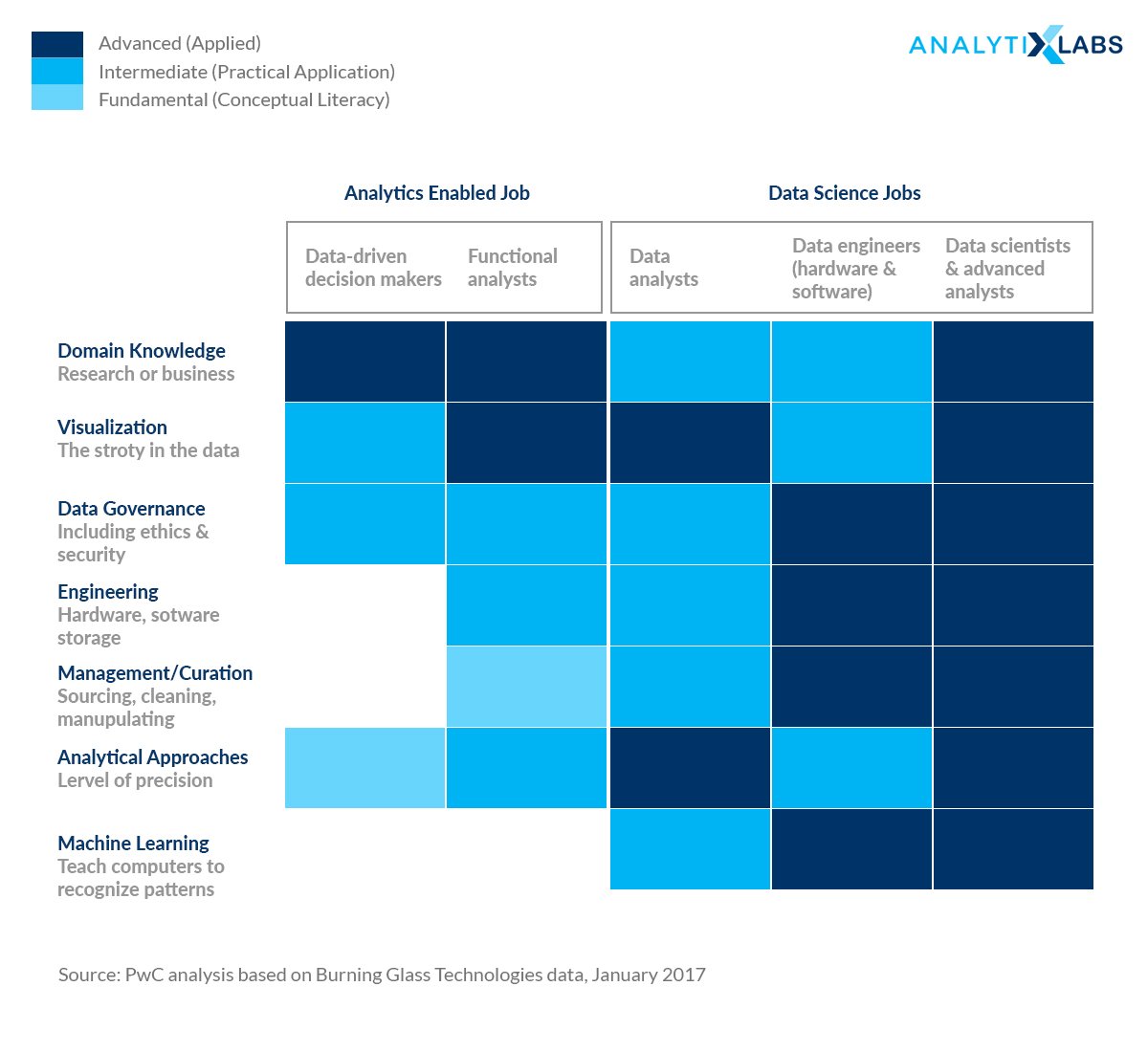
We looked at various job postings on Glassdoor and noted the skill sets each role requires.
To be a business analyst, the most common skills required are:
- Data analysis and extensive data research
- Detailed analytical capabilities
- Quantitative mindset and business intelligence
- Self-learner, investigative nature
- SQL proficiency
- Tableau experience
- MS Excel, Word and PowerPoint skills
- Strong verbal and written skills
- Knowledge of statistical tool like R is an advantage
For instance, here is a job posting for a business analyst at a New York-based venture capital and private equity company:
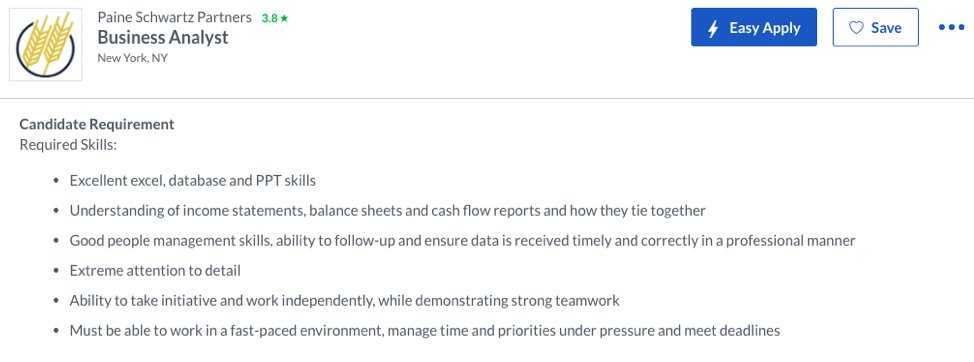
To be a data analyst, the most common skills required are:
- SQL, R, and Python
- Advanced Microsoft Excel and Office skills
- Analytical skills
- Curiosity and reporting acumen
- Understands data mining techniques
- Familiarity with MapReduce, Spark, large-scale data frameworks, machine learning
- Can juggle multiple projects
- Strong verbal and written skills
For instance, here is a job posting for a data analyst at a New York-based finance company:
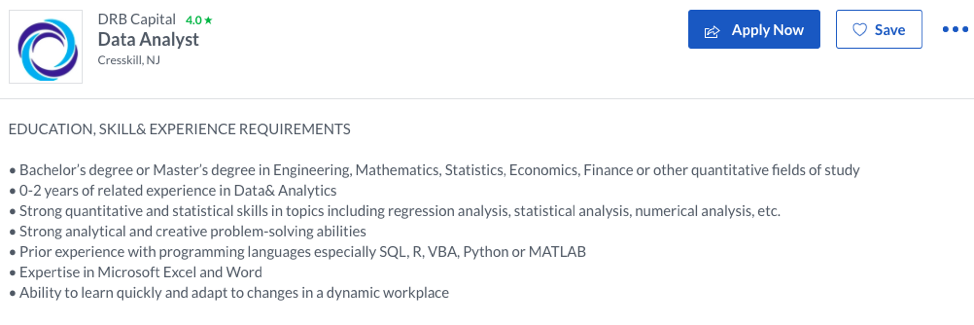
You now have all the details about the job roles, what functionalities they cater to, and the salary ranges. Time for your final leap –
Acquiring Requisite Skill Sets
It is alright if any of the skills are missing from your resume. Not everyone knows everything, but there is always a scope to learn.
You may not have the bandwidth to take a full-fledged degree course to acquire each skill. In fact, you needn’t. The time-saving (and cost-saving) alternative is to look up skill-relevant courses on AnalytixLabs and get yourself enrolled.
These online classes are your key to instant knowledge acquisition because the course contents focus on industrial needs. All the jargon is avoided, and you’ll learn exactly what you require to make an amazing career as a business analyst or data analyst.
Here are a few courses with which you can kickstart your analyst career:
For the Data Analyst role in company
For the Business Analyst role in company
- Analytics Edge (using Excel, SQL, Tableau & R)
- Data Analytics & Visualisation
To understand more about Data Analytics courses and your career prospects, contact the AnalytixLabs team now!
Hope this answers all your queries… If there is anything more you’d like to know, you can mention it in the comments section. Happy learning!
You may also like to read:
1. What Is an IT Business Analyst?








